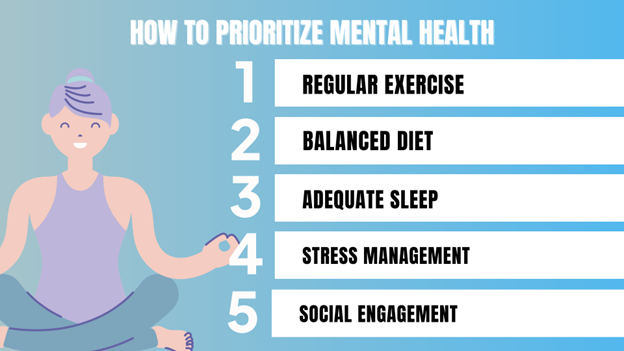Why Prioritizing Physical Health Amplifies Happiness
Individuals pursue happiness through various avenues, such as wealth, interpersonal relationships, or personal achievements. Each person’s path to happiness is unique, reflecting their values, experiences, and aspirations. Ultimately, the journey to fulfillment often involves a blend of these elements.
Of course, all these are indisputable facts; however, there is one element that shapes our overall well-being and happiness to a considerable extent, and it is physical health. Properly addressing our physical needs through regular exercise, a healthy diet, sufficient sleep, and stress reduction not only promotes physical well-being but also enhances mental and emotional health.
So, how does prioritizing physical health enhances different levels and types of happiness? We hope to explore and question that question here.
Connection Between Physical Health and Mental Well-being
When people pay attention to the physical aspect and partake in activities that enhance their physical well-being, changes happen at a physiological level that improves their psychological condition.
The concept, for instance, is that daily exercise is associated with the production of endorphins, which are feeling-good hormones. These chemicals bind to receptors within the brain, leading to the diminishment of perceived pain, as well as the communication of pleasure.
Seroquel, an antipsychotic medication used to treat conditions like schizophrenia and bipolar disorder, is known to have side effects. When it comes to the potential side effects of seroquel, a frequent concern among users is does seroquel cause weight gain, which is an important consideration for many individuals. This can impact physical health and potentially affect overall happiness due to changes in body image and health concerns.
In addition to short-term impacts, individuals who engage in regular physical activity, especially in the long run, experience fewer symptoms of depression and anxiety. Research on the effects of exercise has found that stress and anxiety levels are lower among physically active individuals compared to those who are inactive.

Endorphins are neurotransmitters that improve positive moods from exercising; their work is consistent with serotonin and dopamine. Moderate exercise may raise levels of brain-derived neurotrophic factor (BDNF), a protein that is vital for neuron healthy growth and development, as well as helping the brain give a better performance and reduce how people respond to stress.
The Role of Nutrition in Enhancing Happiness
Nutrition is a cornerstone of physical health that significantly impacts our levels of happiness. Nutrients obtained from foods consumed in moderation are vital in maintaining the normal functioning of both the body and the brain. This is also recommended to be enhanced, especially if the person is experiencing depression and any other mental illness.
For instance, omega-three fatty acids found in fish and flaxseeds are essential for brain nourishment and have been associated with mood enhancement and improved cognitive function. There are also other nutrients, for instance, vitamin D, B vitamins, and magnesium, which serve crucial functions in supporting excellent mental health.
Thus, nourishing the body not only fulfills its nutritional needs but also supports mental well-being. A diet that promotes productivity is essential for a happier life, providing the brain with necessary nutrients and stabilizing mood, unlike unhealthy foods that can cause mood swings.
The Importance of Sleep for Emotional Health
Sleep is a fundamental need that significantly impacts our psychological well-being as individuals. Sleep is a restorative process that allows the body and mind to yield more significant repairs and recoil. Lack of sleep, on the other hand, is correlated to various perils such as depression, anxiety, and mood disorders, among others.
Another effect of sleep is its impact on the brain’s function in modulating emotions and managing stress. It is well understood that during sleep, memories are strengthened, particularly emotional memories that can help us better deal with challenges that we encounter during the waking hours.
Furthermore, sleep deprivation also has an impact on the production of hormones, including cortisol, a stress hormone that is produced by the body. This can cause increased levels of cortisol, which in turn causes several issues, such as increased stress and anxiety.
Obtaining sufficient, high-quality sleep over a 24-hour period, including essential sleep, is crucial for well-being and happiness. Most adults generally require at least seven hours of sleep per night. Research available bed cooling systems at Chilipad if sleep remains evasive.
Managing Stress for Enhanced Well-being
Stress management is one of the key determinants of physical health ‘happiness’ products that are part of human well-being assets.
Stress that persists over a long period is also detrimental to the health of a person’s body since it results in such diseases as high blood pressure and a weakened immune system, and also negatively impacts the emotional well-being of a person—sometimes leading individuals to explore detox options like colon hydrotherapy.
These effects can be mitigated by practicing stress management techniques in our daily routines, including those used in the workplace. Activities that can help bring about this change include practices such as mindfulness meditation, yoga, deep breathing exercises, and progressive muscle relaxation.
Additionally, performing leisure activities that can also help halt stress and anxieties can be of huge benefit. Doing activities like going for a walk, being creative or spending time with people you care about is very helpful when you need to take a break for mental and emotional health.
The Social Dimension of Physical Health
Public activities like group sports, aerobics sessions, or communal activities help to promote friendship circles and a feeling of social inclusion. Such contacts may help to alleviate loneliness, decrease anxiety levels, and have a positive effect on wellbeing.
Strong social ties have been shown to reduce anxiety and depression, boost self-esteem, and enhance empathy levels among individuals.
The social support structure enables clients to manage stress effectively and may offer a sense of direction and meaning in life. Happiness, which comes from enjoyable interaction, strengthens social relations, while obesity has adverse effects on a person’s health.
The Long-term Benefits of Prioritizing Physical Health
Taking care of our physical bodies is, however, more meaningful because we all aim for results that can help bring happiness in the long run. Men who want to minimize the onset of certain diseases like heart disease, diabetes, and some forms of cancer should adopt healthy lifestyles.
Also, one’s physical well-being determines the ability of a person to participate in activities, as well as the ability to derive pleasure from engaging in the activities. Fun always has a way of coming along with health or leaving along with health, for instance, during child’s play, travel, hobbies, etc.
Practical Steps to Prioritize Physical Health
To prioritize physical health and amplify happiness, consider incorporating the following practical steps into your daily routine:
Regular Exercise: Aim for at least 150 minutes of moderate-intensity aerobic activity or 75 minutes of vigorous-intensity activity each week, along with muscle-strengthening activities on two or more days a week.
Balanced Diet: Focus on consuming a variety of nutrient-rich foods, including fruits, vegetables, whole grains, lean proteins, and healthy fats. Limit processed foods, sugars, and unhealthy fats.
Adequate Sleep: Strive for seven to nine hours of quality sleep per night. Establish a consistent sleep schedule and create a restful sleep environment.
Stress Management: Incorporate stress-reducing practices such as mindfulness, meditation, yoga, or deep breathing exercises into your daily routine. Engage in activities that bring joy and relaxation.
Social Engagement: Participate in group activities, join clubs or organizations, and nurture relationships with family and friends to build a strong social support network.

Conclusion
Including care for bodily health becomes an excellent strategy to boost happiness. If people pay proper attention to their fitness, their everyday habits such as exercising, eating the right food, sleeping properly, reducing stress or depression, and socializing can help to gain a healthy body alongside a healthy mind.
Despite the deep-seated link between physical wellness and the fidelity of happiness, there should be a multi-disciplinary focus on the welfare of the human body. This demonstrates that by focusing on physical health, one would be able to live a healthier, happier, and more fulfilling life at the end of the day.
Ensuring children are factored in to your plan for overall well-being start with create a home environment that includes regular exercise. Good habits turn into a lifestyle of wellness that reap benefits on all levels.
FAQs
1. How does prioritizing physical health contribute to happiness?
Prioritizing physical health contributes to happiness in several ways. Physical activity, proper nutrition, sufficient sleep, and stress management all play crucial roles in promoting overall well-being.
2. What role does exercise play in promoting happiness?
Exercise is a powerful tool for promoting happiness due to its ability to release endorphins, the body’s natural mood elevators. Endorphins interact with receptors in the brain to reduce pain perception and induce feelings of pleasure and euphoria.
3. Can prioritizing physical health help manage stress and anxiety?
Yes, prioritizing physical health can significantly help manage stress and anxiety. Engaging in regular exercise, practicing mindfulness or meditation, maintaining a balanced diet, and ensuring adequate sleep are effective strategies for reducing stress levels and enhancing resilience to anxiety.






